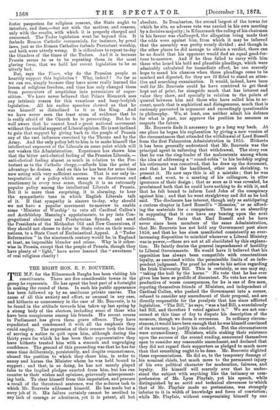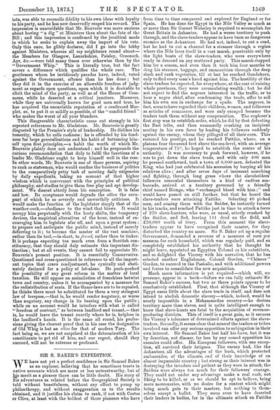THE RIGHT HON. E. P. BOUVERIE.
THE M.P. for the Kilmarnock Burghs has been visiting his constituents. There are five considerable towns in the group he represents. He has spent the best part of a fortnight in making the round of them. In each his public appearance has been followed up by an assiduous private canvas. The cause of all this anxiety and effort, so unusual in any case, and hitherto so unnecessary in the case of Mr. Bouverie, is to be found in the attitude towards him taken up last spring by a strong body of the electors, including some of those who have been conspicuous among his friends. His recent course in Parliament has given them grave offence. They have repudiated and condemned it with all the emphasis they 'could employ. The expression of their censure took the form of serving a notice to quit upon him, although during the thirty years for which he has been their representative they have hitherto treated him with a staunch and ungrudging ,confidence. The ground of this proceeding was that he has for some time deliberately, persistently, and despite remonstrance, abused the position to which they chose him, in order to annoy and harass the Minister whom he was held bound to support ; and that, in so doing, he has not merely played false to the implied pledges exacted from him, but has run counter to their wishes and opinions, grievously misrepresent- ing both. To clear himself from this imputation, and procure a recall of the threatened sentence, was the aiduons task to which Mr. Bouverie addressed himself. He has made but a sorry job of it. His failure certainly cannot be ascribed to any lack of courage or adroitness, yet it is patent, all but
absolute. In Dumbarton, the second largest of the towns for which he sits, an adverse vote was carried in his own meeting by a decisive majority; in Kilmarnock the ruling of his chairman in his favour was challenged, the allegation being made that the odds were against him, from which it may be inferred that the assembly was pretty evenly divided ; and though in the other places he did manage to obtain a verdict, there can be no doubt that his opponent would find an equal good-for- tune to-morrow. And if he thus failed to carry with him those who heard his bold and plausible pleadings, which were admirably calculated for immediate effect, he can scarcely hope to mend his chances when these pleadings come to be marked and digested, for they are ill fitted to stand an atten- tive and searching examination. It would, indeed, have been well for Mr. Bouverie could he have contrived to get theta' kept out of print, for alongside much that has interest and value they show, and specially in relation to the points of quarrel between him and those who have called him to ac- count, much that is sophistical and disingenuous, much that is curiously perverted in argument and exceedingly questionable in philosophy. We, at least, can neither admit his defence for what is past, nor approve the position he assumes as respects the future.
Mr. Bouverie finds it necessary to go a long way back. At one place he began his explanation by giving a new version of the circumstances that attended the withdrawal of Lord Russell from the first Palmerston Administration in 1855. Hitherto it has been generally understood that Mr. Bouverie was the principal agent in enforcing that withdrawal, The story ran that he was the ring-leader of the malcontents among whom the idea of addressing a "round-robin " to his lordship urging his retirement was conceived, that he drew up the document, and that he had the hardihood, other men shrinking, to present it. He now says this is all a mistake ; that he was asked, and went, to a meeting of his colleagues, in utter ignorance of their design ; that as soon as it was revealed, he proclaimed both that he could have nothing to do with it, and that he felt bound to inform Lord John of the conspiracy against him ; and that he went straightway and did as he had said. The disclosure has interest, though only as anticipating a curious chapter in Lord Russell's "Memoirs," or as afford- ing the materials for a comparison. There is an absurdity in supposing that it can have any bearing upon the next election. The facts that Earl Russell and he have never since been members of the same Administration, that Mr. Bouverie has not held any Government post since 1858, and that he has sincb manifested consistently an ever- increasing disposition to mischief whenever a Liberal Ministry was in power,—these are not at all elucidated by this explana- tion. He faintly denies the general impeachment of hostility to Liberal Governments. He would have it believed that his opposition has always been compatible with conscientious loyalty, as exercised within the permissible limits of an inde- pendent judgment. For proof he refers to his action regarding the Irish University Bill. This is certainly, as one may say, "taking the bull by the horns." No vote that he has ever given has been so prolific of discontent. No vote has ever been productive of worse consequences, for he is one of five men, reputing themselves friends of Ministers, and independent of Cardinal Cullen, who pushed the Government into a corner, refused to consider any amendment of their proposal, and are directly responsible for the paralysis that has since afflicted
legislation. "The Bill," he says, "was a bad Bill, a scandalously bad Bill, and therefore I voted against it." We are not con-
cerned at this time of day to dispute his description of the measure, though we deem it erroneous. In ordinary circum- stances, it would have been enough that he was himself convinced of its accuracy, to justify his conduct. But the circumstances were extraordinary. Ministers, while staking their existence upon the success of the second reading, announced themselves open to consider any reasonable amendment, and declared that they did not regard their supporters as pledged to much more than that something ought to be done. Mr. Bouverie slighted these representations. He did so, to the temporary damage of his nominal chiefs, but much, more to the permanent injury of his own political character for moderation, fairness, and loyalty. He himself will scarcely aver that he under- stood the subject with anything like the intimacy or com- prehension of Mr. Lyon Playfair, yet his speech, while distinguished by an acrid and technical cleverness toisithich that of Mr. Playfair made no pretensions, was strangely inferior to it in width of knowledge and force of conviction; while Mr. Playfair, without compromising himself by one iota, was able to reconcile fidelity to his own ideas with loyalty to his party; and he has now deservedly reaped his reward. The impression is Unavoidable that Mr. Bouverie was more anxious about having dig" at Ministers than about the fate of the Bill ; and this impression is confirmed by the jesuitical mode in which he seeks to explain away the import of his vote. Only this once, he glibly declares, did I go into the lobby against Ministers, whereas all my neighbours round about— the Members for Glasgow, Lanarkshire, Paisley, Greenock, Ayr, &c.—were told many times over otherwise than by the "Government Whip." This is literally true, but the fact covers a difference which qualifies the whole case. The gentlemen whom he invidiously parades have, indeed, voted against the Government, oftener than he has done ; but they did it in the exercise of an allowable freedom of judg- ment as regards open questions, upon which it is desirable to elicit the mind of the party, as well as of the House of Com- mons, while be deserted at a critical juncture. Moreover, while they are universally known for good men and true, he has acquired the unenviable reputation of a confirmed Mar- plot, or, to put it as mildly as possible, of the "candid friend" who makes the worst of all your blunders.
This disagresable characteristic came out strongly in his repeated references to Mr. Gladstone. Mr. Bouverie is greatly disgusted by the Premier's style of leadership. He dislikes his temerity, which he calls rashness, he is offended by his fond- ness for large generalisations and his habit of bottoming him- self upon first principles ,—a habit the worth of which Mr. Bouverie plainly does not understand ; and he propounds the curious recommendation that duly to fulfil the functions of a leader Mr Gladstone ought to keep himself well in the rear. In other words, Mr. Bouverie is one of those persons, aspiring to rank as statesmen, who would confine the business of politics to the comparatively petty task of meeting daily exigencies by daily expedients, taking no account of that higher wisdom which is conversant with the principles of political philosophy, and studies to give item free play and apt develop- ment. We dissent utterly from his conception. It is false and low. Its acceptance would degrade the office the occu- pant of which he so severely and unworthily criticises. It would make the function of the Legislator simply that of the
weather cock to the wind that blows. It would occupy him perpetually with the hasty shifts, the temporary devices, the empirical, alteratives of the hour, instead of en- couraging him to legislate afar off, and upon a great system ; to prepare and anticipate the public mind, instead of merely deferring to it ; to become the master of the vast machine, rather than its tool,—in short, to found, rather than to tinker. It is perhaps expecting too much even from a Scottish con- stituency, that they should duly estimate this important dis- tinction; but at all events, they cannot fail to appreciate Mr. Bouverie's present position. It is essentially Conservative. Questioned and cross-questioned in reference to all the import- ant topics that crave readjustment, he cynically and obsti- nately declared for a policy of let-alone. He pooh-poohed the possibility of any great reform in the matter of local taxation. He will oppose an assimilation of franchises betwixt town and country, unless it be accompanied by a measure for the redistribution of seats. If the Game-laws are to be repealed, be thinks there must be substituted for them a very stringent law of trespass,—that is, he would render nugatory, or worse than nugatory, any change in its bearing npon the public ; while on no account would he interfere with what is called "freedom of contract," as between landlord and tenant,—.that is,, he would leave the tenant exactly where he is, helpless in the landlord's hands. It is the same all round, his profes- sions giving the clearest proof that in his case the designation of Old Whig is but an alias for that of modern Tory. The fact being so, we are not surprised at the determination of his constituents to get rid of him, and our regret, should they succeed, will not be extreme or profound.











































 Previous page
Previous page